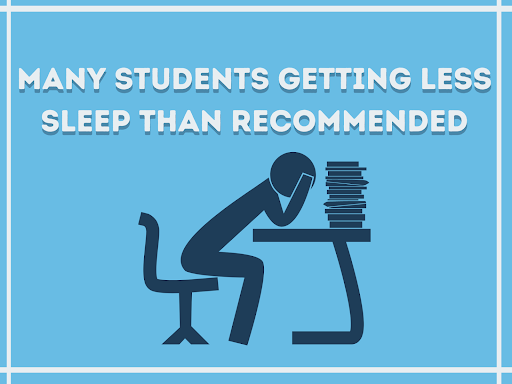Many students getting less sleep than recommended
Students express difficulty in getting enough sleep amidst the busy schedule as a high school student.

October 21, 2022
Teenagers are recommended to get 8-10 hours of sleep per night. However, this is not the case for most.
In a survey taken by 89 seniors at LFHS, 59% of students said they get 6 hours of sleep or less. 42% of students reported that they always feel sleep deprived.
So why are so many students sleep deprived?
Many students think it stems from the culture of LFHS.
“I think there’s so much emphasis, especially in this community, to overwork yourself and be the best at anything and everything you can do,” senior John Turelli said. “And when you’re constantly maximizing your output, something else in your life has to go, and a lot of times that’s sleep”.
Amidst extracurriculars, homework, college applications, and taking care of mental health, prioritizing sleep can be very difficult. Senior Janel Sharman also finds difficulty in fitting in sleep with her busy schedule.
“I definitely do not have a good balance with sleep,” Sharman said. “With such a busy schedule, a healthy amount of sleep is usually the first thing to go.”
Sharman’s typical afternoon consists of either going to a theater rehearsal or editing for New Media, which lasts until 6 p.m. or later. She then spends around three hours on homework, and an hour on college essays. If she makes time to get outside or do something for herself, she doesn’t usually get to bed before 12:30 or 1 in the morning. Because she also takes an early bird class, she also has to get up around 6:35.
“On days when I do get 8 hours of sleep, I feel so much better, and I realize how negatively lack of sleep makes me feel,” Sharman said.
Senior Natalie Goeks typically gets around 6 hours of sleep each night. Goeks is concerned about the fact that sleep deprivation is normalized in society.
“I think sleep takes a backseat in our community, which has serious psychological and physical effects that people don’t necessarily know about,” she said.
According to AP Psychology teacher Ms. Julie Harris, getting enough sleep and good quality sleep is important for teens for both physical and emotional reasons.
Harris said that sleep refreshes and rejuvenates our bodies and brains and fortifies the immune system. This can help to reduce the influences of cold, flu, heart disease, obesity, and diabetes. Sleep is really important – for concentration in school, for avoiding accidents in sports and driving, and more.
Harris sees the impact of sleep on her first period class. “I definitely see in students the fatigue, lack of concentration, and saying things they maybe wouldn’t have said because impulse control is limited. Students seem to be more dependent on coffee and caffeine,” she said.
Whether it’s from the impact of school, individual choice, or cultural norms, students are not getting enough sleep, and are forced to rely on caffeine and power naps just to get through the day – often resulting in negative consequences.







J • Oct 24, 2022 at 9:24 am
Maybe we should schedule the school day as if we prioritised the well-being and survival of our students over the assumption that students should be shuttled by their parents. Start the school day later more of the week, run enough busses to pick up all students outside the walk range, and offer students enough time to sleep in.
Marc • Oct 22, 2022 at 8:54 pm
Sunlight exposure is a great way to increase sound sleep. The best “supplement” for sleep is to get plenty of non-burning sun exposure, which contains blue light. That habit can increase sound sleep by about 40 minutes per night. Regular, non-burning sun exposure in the morning, which contains blue light, also resets the circadian rhythms, provides serotonin for a great mood and assists with weight control. Then, turn off the tech devices early at night, so that melatonin will turn off the body’s tensions and let one sleep peacefully. Remember that sun exposure is the key to the whole process.
For more information and references: sunlightinstitute.org. In addition, read the book, Embrace the Sun.